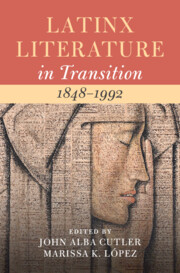Book contents
- Latinx Literature in Transition, 1848–1992
- Latinx literature in transition
- Latinx Literature in Transition, 1848–1992
- Copyright page
- Dedication
- Contents
- Figures
- Contributors
- Acknowledgments
- Introduction
- Part I Space
- Part II Being
- Part III Time
- Chapter 9 Death at and Afterlives of the Silver Dollar Café in Chicanx Cultural Production
- Chapter 10 Passing Time
- Chapter 11 Romancing Latinidad
- Chapter 12 Singing Apocalypse
- Part IV Form
- Part V Labor
- Bibliography
- Index
- References
Chapter 10 - Passing Time
Latinx Racialization, Modernist Satire, and the Captivity Narrative
from Part III - Time
Published online by Cambridge University Press: 10 April 2025
- Latinx Literature in Transition, 1848–1992
- Latinx literature in transition
- Latinx Literature in Transition, 1848–1992
- Copyright page
- Dedication
- Contents
- Figures
- Contributors
- Acknowledgments
- Introduction
- Part I Space
- Part II Being
- Part III Time
- Chapter 9 Death at and Afterlives of the Silver Dollar Café in Chicanx Cultural Production
- Chapter 10 Passing Time
- Chapter 11 Romancing Latinidad
- Chapter 12 Singing Apocalypse
- Part IV Form
- Part V Labor
- Bibliography
- Index
- References
Summary
This chapter attends to the formal and cultural function of Latinx racial passing in Who Would Have Thought It? (1872) by María Amparo Ruiz de Burton. Critical conversations about the orphan protagonist of the novel, Lola Medina, interrogate her rescue from Indian captivity and the gradual “whitening” of her dyed skin as a form of aspirational assimilation into Anglo-American society. Scholars have also studied the ways in which Lola’s captivity story is informed by the historical precedent and publications surrounding the repatriation of Olive Oatman to white American society after her five-year captivity among the Mohave in the 1850s. This contribution reads Lola’s performance of Latinx racial passing alongside the captivity narrative, newspaper articles, and visual culture from the Oatman case to argue how the idea of “passing” operates in the novel as a form of political critique and a catalyst for modernist, formal innovation. Lola’s narrative of Latinx racial passing not only illuminates an early discourse of Latinx racialization, but also catalyzes a modernist satire of Anglo-American imperialism.
Keywords
- Type
- Chapter
- Information
- Latinx Literature in Transition, 1848–1992 , pp. 178 - 194Publisher: Cambridge University PressPrint publication year: 2025

